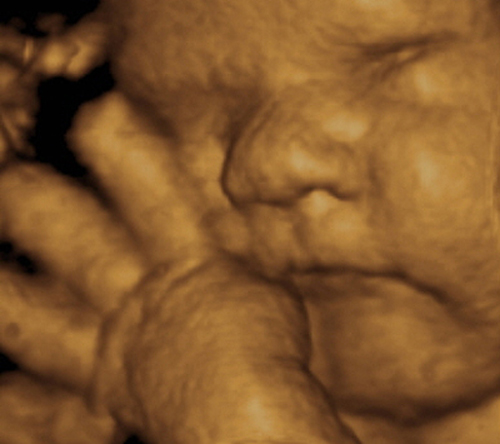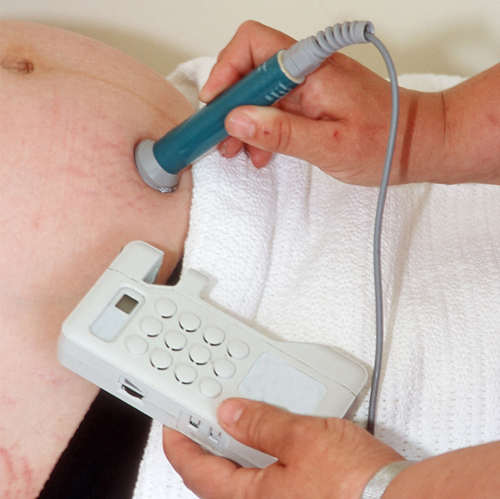You are 38 Weeks and 4 Days 10 days to go…
Could your baby be dreaming already? A lot of his movements are occurring when he’s fast asleep.
Your baby today
Your baby’s neck muscles have strengthened, so the head can be
held well away from the chest wall. Once delivered though, the buoyancy
provided by the amniotic fluid will be lost and you will need to support
your baby’s head at all times while holding him.

Your baby has been practicing breathing
since the 10th week of pregnancy but now the pattern has changed from
short practice bursts lasting 10 seconds or so, to a regular rhythmic
breathing pattern of approximately 40 breaths per minute, just as the
baby will breathe after birth.
Eye movements have
also matured with periods of rapid eye movement (REM) lasting for just
over 25 minutes at a time and rest periods lasting just under 25
minutes. REM sleep is closely coupled with periods of increased activity
and a faster heart rate. So, just because your baby is moving it
doesn’t always mean that he’s awake.
Although your baby
cannot stretch out as freely as before, movements of at least 10 times a
day should continue in the same familiar pattern and are a reassuring
sign of a healthy baby.
… Nutrition
Fuel for labor
Most hospitals don’t allow women in labor to eat or drink,
because if you need general anesthesia, there’s a risk of aspiration.
But in 2008, the American College of Nurse-Midwives issued a clinical
bulletin stating that allowing a woman in labor to eat or drink provides
her with hydration, nutrition, comfort, and can even reduce stress. Ask
your doctor if you can eat, and if so, what. A few suggestions: Choose
something light, such as soup or broth, popsicles, applesauce, or ice
chips—which you can chomp on even if you’re not allowed food. And your
partner should snack to keep his strength.
Ask your doctor if you can drink or eat during labor. Drinking will keep you hydrated while your body is working hard.

… Doctor
| Q: |
What is “stripping the membranes” and could I have this instead of being induced if I end up being overdue?
|
| A: |
Depending on your health and the baby’s condition, and many
other factors (for example, you’re more than 42 weeks along, you have
high blood pressure, you have an infection), your doctor may induce
labor. There are many ways to do this, including stripping the
membranes. With a gloved finger, your doctor checks your cervix and
sweeps her finger over the membranes that connect the amniotic sac and
the uterine wall. The goal of this is to stimulate the release of
hormones that may start labor contractions. Although this is likely to
be an uncomfortable procedure, it should not cause you actual pain; you
will also experience a mucus/bloodstained “bloody show” —following stripping of the membranes, which is quite normal.
The procedure can be done at your doctor’s office or in the hospital . Your doctor will advise you closer to the time.
|
You are 38 Weeks and 5 Days 9 days to go…
Don’t just wait for contractions—it’s worth familiarizing yourself now with the signs that may mean labor is imminent.
Your baby today
In many ways you will be the best judge of the likely size of
your baby, especially if you can compare it with a previous pregnancy.
An ultrasound scan can estimate the weight, but as with all other
measurements at this time it has a fairly wide margin of error.

When does labor actually start?
If it’s your first pregnancy, it can be difficult to recognize the
signs that the baby is on his way. Some women get lower back pain that
is minor before becoming painful. You might notice a bloody show ,
which can happen well before true labor actually starts. Your water may
break as the sac containing the amniotic fluid bursts open. Even if
your water breaking is not accompanied by contractions you should still
inform your doctor of what is happening.
Finally, the most obvious
sign is contractions: these painful tightenings of your uterus will
increase in intensity and become more regular as labor progresses.
Contractions are associated with the dilation and shortening of your
cervix, so your doctor will examine you to see how far you’ve progressed .
If you think that you
have gone into labor, stay calm and telephone your doctor and listen to
her advice. Inform her of your symptoms and, especially, describe your
contractions. If you are having contractions every 5 minutes that last
for one minute (time them), and they’re so uncomfortable that you’re
forced to stop what you’re doing, you should think about going to
hospital.
Fetal monitoring
If there are no complications or reasons for concern,
your baby’s heartbeat will usually be monitored using a handheld device
much like the one used during your prenatal appointments. You may be
hooked up throughout the entire labor and birth, or your doctor may
listen to your baby’s heartbeat every 15 to 30 minutes, which means that
you can move around as much as you like in between these checks.
If you’ve had
complications in pregnancy, or problems develop during labor, the doctor
may monitor the heartbeat using a CTG .

… Doctor
| Q: |
How long am I likely to stay in hospital after the birth?
|
| A: |
In most maternity units, there’s a degree of flexibility as to
how long you remain in hospital. If you want to stay for as brief a
period as possible, talk to your doctor. It depends on many variables,
but federal law says insurance companies can’t force you to check out
before 48 hours for a vaginal delivery, or 96 hours for a cesarean. It
is recommended that a healthy newborn stay in the hospital for at least
48 hours. How long you stay in hospital will largely depend on your type
of delivery. If you have a vaginal birth, you should be able to go home
after six hours, but a cesarean may mean you need to stay in for about
three days. If your baby is born early, is unwell, or is struggling to
feed or maintain his temperature, you’ll be advised to stay in the
hospital. If your baby has to remain in the hospital for a long period,
you would have to go home and visit him in the neonatal intensive care
unit .
|